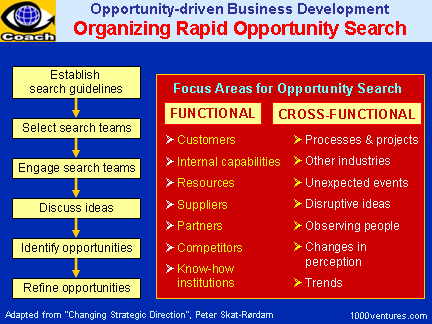|
New
Product Development (NPD)
Shift To
New Approaches: 7 Reasons |
-
Designers, not
marketers, identify new product opportunities.
Traditional marketing tools are good for analyzing existing market
ideas. Intuitive thinking, qualitative approach used by
designers is
very good for imagining new possibilities. Designers identify new
product opportunities, create design briefs,
conduct
market research, develop a
platform for
further innovations and even brief
advertising companies on how to
promote the new product.
|

|
|
|
Looking From Outside In
By Masaaki Imai |
|
Understand what's going
on in the
real world ask these questions relentlessly:
-
What's happening in your marketplace?
-
How the needs are changing?
|
|
Leadership and Management |
|
|
|
"Things work
out best for those who make the best of the way the things work out."
Top 10 Essential Requirements To Be
A Great Strategic Thinker
Essential Element #4: You must have an extremely high level of awareness
of what is happening around you and be open to absorbing all that you
can. In any business, there are clues, often subtle, both internal and
external to help guide future direction and to identify opportunities.
Great strategic thinkers take all of this in and then they set aside
time to think about all the experience and information to guide them in
the planning and working on the issues, challenges and
opportunities
that lie ahead.
The Power of Your
Cross-Functional Excellence
If you build broad
cross-functional
expertise, no idea will be wasted! Your
mind can accept
only those ideas that have a frame of reference with your existing
knowledge. It rejects everything else. If your knowledge is functionally
focused, you'll be open to new ideas related to your functional expertise
only and will miss all other learning and innovation opportunities. If you
develop a broad cross-functional expertise, no new idea will be wasted. It
will immediately connect with the existing knowledge and will inspire you, energize you, and encourage your
entrepreneurial creativity.
The broader your net is, the more fish you catch...
More
Seek the Optimum Balance
of Opportunities
The task of a
business architect
and a
process manager is to
create
systems, within a sensibly structured business, that
inspires
intrapreneurs,
empowers employees, and
enables people to
achieve higher productivity and greater
competitive advantage.
In their
book, Control Your Destiny or Someone Else Will, an analysis of
Jack Welch's GE
and a business classic hailed as the unofficial
GE Leadership handbook, Noel M. Tichi and Stratford Sherman cite the
cause of a plant that makes wire, another that wraps the wire into coils,
and a third that assembles the coils into lamps. If these are organized as
three separate businesses, each optimizing its own performance, the totality
may well not be optimized. Organized as a single unit, however those three
plants can seek the optimum
balance
of opportunities: for instance, making a costlier wire may help to produce a
cheaper lamp.
The Challenge for
Small
Enterprises
As
young venture is organized around a new product or service meetings of
the senior managers focus on problem solving and
cash flow
and have little or no time for
identifying and exploiting opportunities. To overcome this issue
dedicate one management meeting a month to
looking for opportunities, new ideas,
market trends,
unexpected successes and
competitive actions. Communicate the long-term benefits of investing
time in these activities to your team members to ensure their willing and
active participation.
Happiness It's All in Our Own Hands
When you encounter a
problem, try to
look for the good points. Everything has at least one good
point. Even sickness has its positive side. You get some extra rest
or have more time to spend with your family or you use the period of
recuperation as an opportunity to turn to
dharma
Assess Your Management of Opportunities...
Turning
Risks Into
Opportunities...
Turning Knowledge into Opportunities...
Take a
Different View...
Effective Questioning...
Observe Disruptive People...
Prototyping
Encouraging Accidental
Discoveries...
Cross-Pollinate
Your Ideas with Others...
Asking Searching Questions...
|